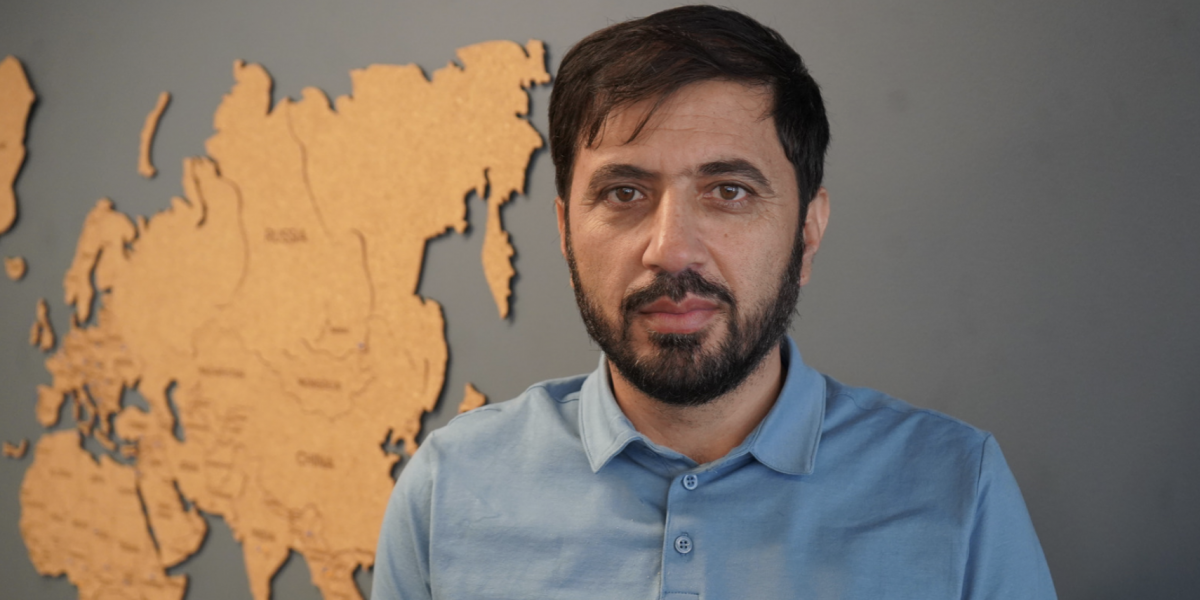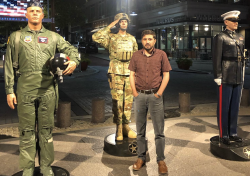Bahar’s Story, from Afghanistan to the United States
01 September 2023|Chloe Gunther

This story first appeared in JRS INSIDER, a monthly newsletter including stories of impact across JRS global.
August marked two years since the US left Afghanistan and the Taliban resumed power. Bahar Sayedi worked with the United States government in Afghanistan for 20 years, 12 of which were spent with US Embassy in Kabul. He evacuated the country with his wife and four young children in 2021. This is his story.
Bahar was born in Nangarhar, an eastern province, the same year that the Soviets invaded Afghanistan. His father, a police officer for the Afghan government, was killed when Bahar was just a toddler.
“I do not have any memories of him,” Bahar said. After his father’s death, Bahar’s grandfather stepped in to help care for him and his siblings.
As violence escalated in their province, Bahar said he and his family realized they had to leave.
“The more remote areas [of Afghanistan] were not secure, so we moved to Kabul,” he said.
After the end of the Soviet’s occupation, civil war broke out across the country and lasted for several years, those living in Kabul, including Bahar’s family, were left without electricity or running water. He described frequent walks to his neighbor’s house to use their well during this time.
One day, while Bahar was outside playing with some of the local kids, his neighbor gave him money to go to the store.
“We were small, we were playing…he said take this money and bring back some bread and eggs.” Bahar said.
“I went to the bakery, and I heard a boom. I did not understand what happened.” A rocket had landed and detonated just a few meters from on his path to the store.
“When I woke up, I saw bodies all around,” he said.
He was rushed to the hospital with a serious wound on the back of his shoulder.
By 1989, when the Mujahideen drove out the Soviets, Bahar was a teenager and Kabul was the epicenter of battle. Amid power struggles, the country descended into a civil war and out of this chaos, the Taliban emerged.
Bahar started his first job as an interpreter at 22 years old when the US invaded Afghanistan. “The job was intense,” he said. He laughed lightly remembering a particularly difficult mission when he was interpreting for a group of Scottish soldiers and struggling to understand their accents.
He praised his colleagues who worked in combat zones. There, the smallest error held the highest stakes. After several years, he was ready to move on from the stressful environment, so he left his job as an interpreter to attend Kabul University.
After earning his degree, Bahar worked for the US Agency for International Development (USAID) as a senior program budget advisor. Then he worked for the US Embassy in Kabul as a program management specialist until 2021.
Bahar described August 2021 as a month of chaos. Just a few days before the US left Afghanistan, he met with his manager, a new hire who was excited about the year ahead of them. Bahar recalled feeling skeptical that they would all be there to see the hard work come to fruition, but he embraced his new boss’s enthusiasm.
Three days later, he received a message from the same manager telling him to take photographs of his certificates and degrees. They were burning all the important documents in the embassy.
Bahar went to the airport with his wife, and kids, the youngest of whom was only a few months old. He remembers the chaotic and dangerous scene as the Taliban shot into the air, trying to scare the crowd into dispersing. Security had already evacuated the airport, people trying to flee crowded the runways.
He and his family could not get in. Instead, a few days later, a bus from the US government would pick them up and escort them onto a plane.
Bahar and his family stayed on a military base in Quantico, VA for a month until he got a visa to the United Kingdom.
He jumped at the opportunity because he knew Afghans arriving to the UK were not forced to stay on military bases like they were in the US. Bahar also wanted to be closer to Afghanistan in case he and his family could return to Kabul.
For five months, his kids who were old enough to attend school, excelled in the UK. At parent-teacher conferences, their teachers noted his kid’s intelligence and respect.
“There, I found out they were really great…they told me I had to be very proud of them…That was really inspiring,” Bahar said.
A few months later, Bahar and his family returned to Kabul, hopeful they could live there safely with Bahar’s mother and extended family.
But Bahar and his wife did not trust the Taliban. He learned that the Taliban had been targeting members of the former Afghan National Security Forces
“They killed a lot of innocent people as well, in the name of ISIS. Dozens of bodies were discovered every day in Nangarhar,” Bahar said.
“It is a hard decision to leave a country for good,” Bahar said.
 But, considering the presence of the Taliban, threats from ISIS, lack of opportunities for women, and the education available to their kids, they realized they could not provide the lives they wanted for their family if they stayed.
But, considering the presence of the Taliban, threats from ISIS, lack of opportunities for women, and the education available to their kids, they realized they could not provide the lives they wanted for their family if they stayed.
When Bahar had another opportunity to go to the US, he and his wife weighed their options. Ultimately, they returned to the US on March 8th, 2023.
His mother is still in Kabul and Bahar talks to her often, but of course it is not the same as being there with her. A few months ago, she sustained a stroke that damaged her eyesight and memory.
At the end of our conversation, Bahar reflected on his community still in Afghanistan. He said they are very concerned with their children not having access to quality education, particularly young girls.
His hope is that one day, it will be safe for him to return to Afghanistan. He is looking for the Taliban to allow more freedoms and flexibility.
“So…still waiting, I’m still hoping…but I have learned they won’t change,” he said.
There are hundreds of thousands of families like Bahar’s still in Afghanistan or displaced across the world. If you would like to support Afghan people fleeing for their lives, please consider donating here today.

